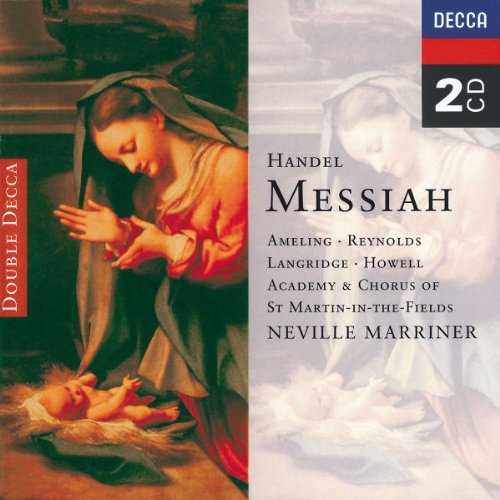
Composer: Georg Friederich Handel
Performer: Elly Ameling, Anna Reynolds, Philip Langridge, Gwynne Howell
Orchestra: Academy of St Martin in the Fields Chorus, Academy of St Martin in the Fields
Conductor: Sir Neville Marriner
Audio CD
SPARS Code: ADD
Number of Discs: 2 CD
Format: APE (image+cue)
Label: Decca
Size: 613 MB
Recovery: +3%
Scan: yes
CD 01
Part 1
01. Symphony
02. “Comfort ye, My people… Ev’ry Valley shall be exalted”
03. “And The Glory Of the Lord”
04. “This said the Lord… But who may abide…”
05. “And He shall purify the sons of Levi”
06. “Behold, a virgin shall conceive…O thou that tellest good tidings”
07. “For behold, darkness shall cover the earth…The people that walked in darkness”
08. “For Unto Us A Child Is Born”
09. Pifa (Pastoral Symphony)
10. “There were shepherds… And lo, the angel of the Lord… And the angel said unto them – And suddenly”
11. “Glory To God In the Highest”
12. “Rejoice Greatly, O Daughter Of Zion”
13. “Then shall the eyes of the blind…He shall feed his flock”
14. “His yoke is easy”
Part 2
15. “Behold the Lamb of God”
16. “He was despised”
CD 02
01. “Surely He hath borne our griefs”
02. “And with His stripes we are healed”
03. “All We Like Sheep Have Gone Astray”
04. “All they that see him…He trusted in God”
05. “Thy rebuke hath broken his heart…Behold and see”
06. “He was cut off…But Thou didst not leave his soul in Hell”
07. “Lift up your heads”
08. “Unto which of the angels…Let all the Angels”
09. “Thou art gone up on high”
10. “The Lord gave the word”
11. “How beautiful are the feet”
12. “Their sound is gone out”
13. “Why do the nations…Let us break asunder”
14. “He that dwelleth in heaven…Thou shalt break them”
15. “Hallelujah”
Part 3
16. “I Know That My Redeemer Liveth”
17. “Since by man came death”
18. “Behold, I tell you…The Trumpet shall sound”
19. “Then shall be brought to pass…O death…But thanks be to God”
20. “If God be for us”
21. ” Worthy is the Lamb… Amen”
My Odds-On Favorite Recording of this Great Work
Handel – Messiah / Ameling • A. Reynolds • Langridge • Howell • Marriner
One of the finest ways people around the world have been celebrating Christmas for more than 250 years, this is the 1743 Covent Garden version of Handel’s Messiah, created during the noted German composer’s long, successful London residence. The art work that caused the sitting King of England to stand in rapt admiration, and has led thousands of audiences to similarly stand since. The famous work was here performed, in this many many times performed/recorded oratorio, in 1976 by Sir Neville Marinner , with the Academy and Chorus of St. Martin-in-the-Fields, soloists Elly Ameling, Anna Reynolds, Philip Langridge, and Gwynne Howell. It is full in sound, but still clear and sharp, and is my longtime favorite of this superb music.I must admit, however, that in my younger,more culture vulture days, I would hardly countenance any music not made by Marriner and the Academy. Am better now, but this is still my odds-on fave, newly purchased on CD for the season,the old audio tape had had it.
Excellent 1976 performance and sound
This 1976 performance of Handel’s Messiah is led by Sir Neville Marriner and his Academy of St. Martin-in-the-Fields orchestral and choral forces. It is important to note that Marriner uses Christopher Hogwood’s edition of Messiah from the first 1743 London performance. This creates only a few differences than most might be used to, but easily trumps Hogwood’s own later performance from the early 80’s through sheer energy and abilities on display. Decca’s recording came in direct competition with 3 or 4 high-profile Messiah recordings from the previous decade and Decca provided Marriner clear, pétillant sound at St. John’s, Smith Square in comparison to those 60’s recordings.
The Orchestra: These are sparkling performances all around. Marriner and the Academy orchestra are virtuosic and magnetic, with bouncy, transparent textures that are warm in their use of modern instruments, but are crystal cut in their direction from Marriner. Marriner moves the opening Overture in a dance-like forward motion, but is a fully satisfying sound, and that is just the Sinfonia. St. Martin-in-the-Fields gives enough weight without sounding stodgy nor anemic, but gladly puts down the accelerator, especially the choral movements, while lovingly embracing the more intimate moments.
The Chorus: Marriner’s choral movements are truly allegro when marked so and the choral forces have crystal-clear lightness and sharp-edged preciseness in the swift portrayals of ‘He Shall Purify’, ‘For Unto Us’, and ‘O We Like Sheep’, for example, but are blazingly full-bodied in ‘His yoke’, ‘Hallelujah’, and Worthy is the Lamb’. Marriner is deft enough to not rush ‘And the Glory of the Lord’, giving weight to the triple meter without rushing into a beat-to-the-bar which sinks many runaway tempos of modern period performances. The Academy chorus sopranos use little-to-no-vibrato in typical English style, I personally prefer a more symphonic chorus approach, but I like the lack of old-Germanic wobbliness, and their clear textures allow the chorus amazing flexibility in the faster passages. The chorus is well heard in relation to the instruments.
The Vocalists: The soloists are a solid lineup on this recording. The highpoint is Philip Langridge’s clear, effortless tenor, with precise diction, and whose sound does not bleat in typical English tenor fashion. Langridge’s ornamentations are small, tasteful, and purposeful, and never takes away from the written music. Dutch soprano Elly Ameling is bit more dramatic, with more operatic portamento guiding her vocal movement, but giving much more character than the rest of the team. That said, Ameling’s ornamentation is the more distracting of the soloists, with some intrusive choices, but her singing is welcome here. I was initially reticent of Welsh bass Gwynne Howell’s enormous vocal production, a bit off-putting on first hearing in the over-melismatic ‘But Who May Abide’, but I eventually found delight in his upper range, one that has a particularly glorious ring that easily sets him with the best bass singers on ‘The Trumpet Shall Sound’ for sheer forceful drama. Alto Anna Reynolds is a bit Plain Jane to me, but she is rather sensitive in the lengthy ‘He was Despised’.
The Continuo: Lastly, the basso continuo of cello, harpsichord, and organ is delightfully unintrusive; that jangly harpsichord can turn me off of so much Baroque music rather quickly if too forward in the sound, and here it is perfect. I greatly prefer organ as my continuo, so I appreciate its heard, additional presence in the sound; plus you get the authority of Christopher Hogwood on the organ continuo here. The trumpets are properly bright and cuts through in ‘The Trumpet Shall Sound’ and choruses.
The Differences: There are a number of small differences with the 1743 London edition: the extra bars of music in the opening ‘Every Valley’ are hardly worth mentioning, but always catch me off guard. More noticeable is the compound meter (12/8) of ‘Rejoice Greatly’ that can be very disconcerting if you have only heard the simple meter (4/4) version, but is a pleasant difference. And of course for every aria/recitative and duet, Handel provided 2-4 alternate versions for other voice ranges and vocal combinations in different keys, but there were a few arias I associate with a higher tessitura singer but here was sung by a different voice part; the difference is negligible for me.
The Choices: From the era this recording was made, this was considered a period performance. But since today’s recordings use period instruments and railway-tragedy speeds, Sir Neville Marriner’s performance now holds the middle ground between the weighty stodginess of the big orchestras and the wheedly, vinegary sounds of original instruments. At the time, Marriner came in direct competition with Sir Colin Davis and a pared down LSO on Philips, a very good performance with starry soloists, and Sir Charles Mackerras with the Ambrosian Singers on EMI. These are still good performances and certainly provide relevancy today, and I think my initial preferences lie with Marriner and Davis for sheer excellence. If you wish to go truly old school, Eugene Ormandy and Philadelphia on CBS are big boned with the Mormon Tabernacle Choir, Robert Shaw on RCA was influential for its time, and Sir Thomas Beecham on RCA/Sony has an amusingly over-Romanticized recording. If you wish to meet the modern era, I really like the late Sir Richard Hickox on Chandos with his solid adult chorus, but much goodwill has also been given William Christie on Harmonia Mundi, McCreesh on Archiv, as well as the older Pinnock and Hogwood, but I don’t care for the piping boy-choir sound in those Handel choruses.
Conclusion: This recording of Sir Neville Marriner’s Messiah performance features excellent orchestral work, lightly swift, but appropriately full-sounding choral work, a solid team of vocal soloists, and clear, full sound from Decca. I think this recording will duly satisfy both the average listener looking for their first complete Messiah as well as the collector looking for outstanding performances of this seminal work. Highly Recommended!
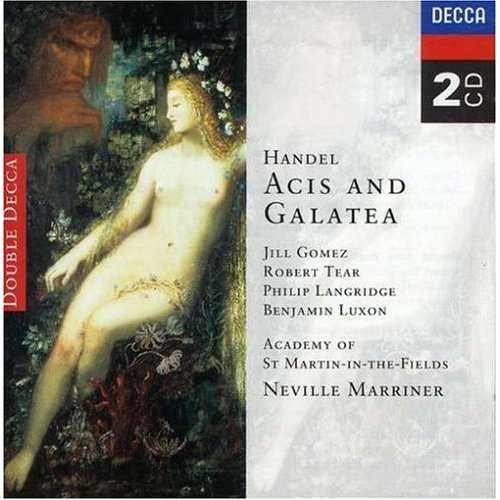
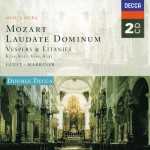
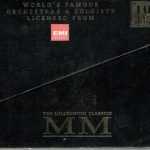
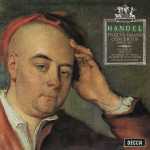
ok. thanks
Thanks
Very nice! Thank you.
thanks so much!
Thank you.